Can Donald Trump get what he wants?
- Published
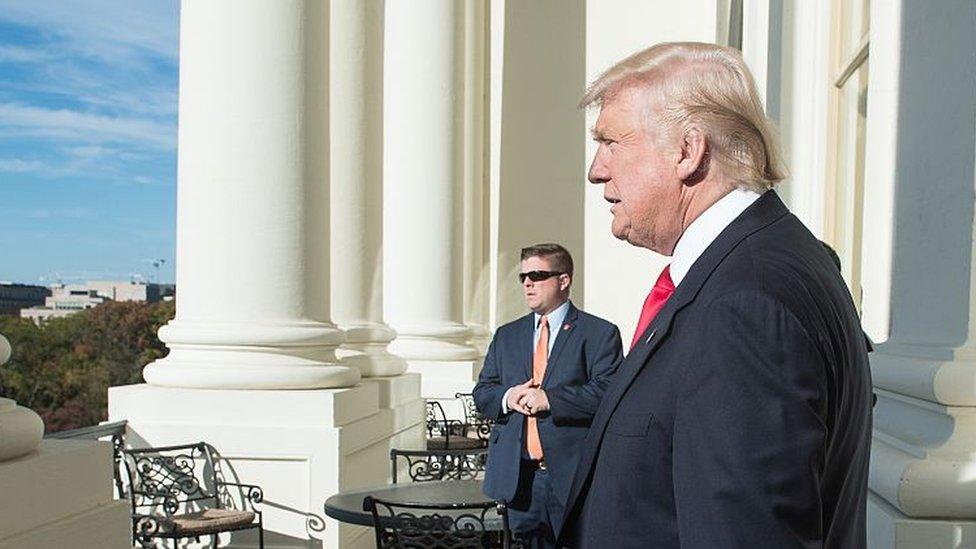
As Donald Trump prepares to take the presidential oath of office, it's time for his campaign rhetoric to meet with the cold, hard reality of governing.
Mr Trump made a great many promises in his run for the presidency - some concrete, some vague and some contradictory. Part of the magic of his appeal was that his various supporters seemed to focus on the ideas with which they agreed and ignore the ones that they didn't like.
The test now will be for the newly minted president to keep his coalition together as he tries to follow through on what he identifies as his top policy priorities. Can he forge a consensus between the anti-establishment masses that fuelled his campaign with the Washington powers that populate Congress and are necessary to successful implement his agenda?
Mr Trump ended his campaign rallies with the song You Can't Always Get What You Want by the Rolling Stones. It always seemed a peculiar choice, but perhaps it will be a source of comfort for him as he contemplates the early goals of his presidency. Here's a look at what he wants - and the likelihood that, if he tries, sometimes, he just might find he gets what he needs.

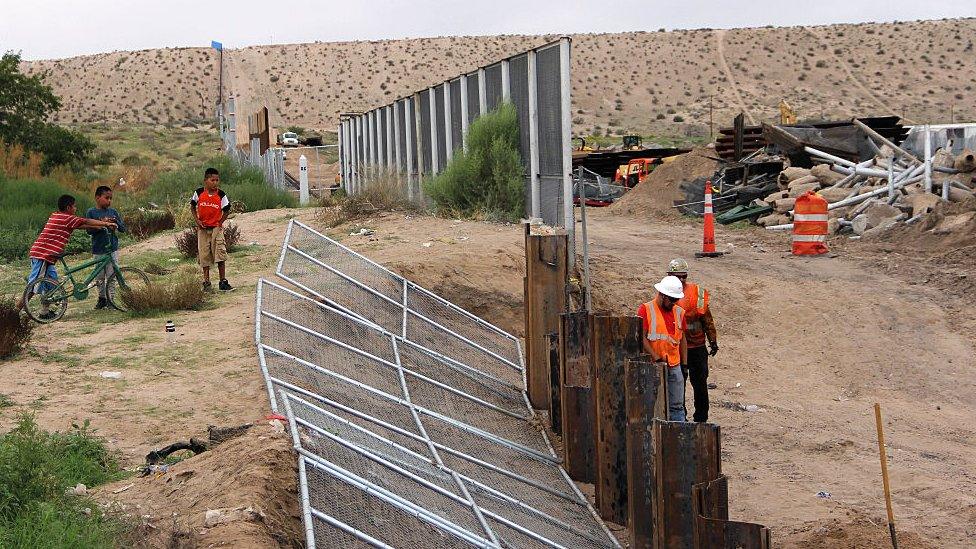
Building the Wall
The "impenetrable, physical , tall, powerful, beautiful" wall along the US-Mexico border was a central part of Mr Trump's campaign, from the moment he stepped off his golden escalator and into American hearts (or, at least, the hearts of a plurality of voters in enough states for an Electoral College majority).
The wall itself was enshrined in the Republican Party platform, which promised that it would cover the "entirety of the southern border" and be "sufficient to stop both vehicular and pedestrian traffic".
The price tag on such a massive construction project has been estimated at more than $20bn (£16bn), however, and despite Mr Trump's insistence, the Mexican government appears uninterested in paying for it. So, whither the wall?
Trump's promises: Before and after
Over the course of the past few months, some of Mr Trump's advisers have hinted that the wall may not be quite the imposing edifice his legion of supporters likely envisioned. Just recently, former House Speaker Newt Gingrich said promising that Mexico would pay for said barrier was a "great campaign device". Campaign devices don't pay for concrete and rebar.
Then, in his first interview as president-elect, Mr Trump acknowledged that part of that wall may be a big, beautiful fence. Such is the reality of trying to build things along a 2,000-plus mile border that includes mountains and desert.
Outlook: The wall was a very tangible promise Mr Trump made and stuck by, even when he was subjected to criticism and ridicule for it. He'll have to make sure he has something to show for his efforts, if only to give himself a nice backdrop to stand against for the inevitable photo-op. Chances of a monumental Great Wall of Trump ever becoming a reality, however, seem slim.

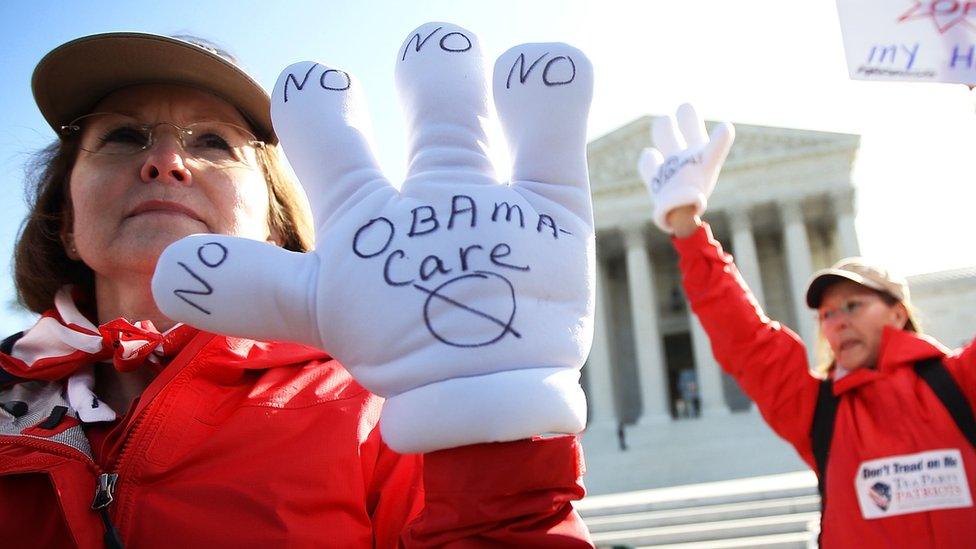
Dismantling Obamacare
For more than six years the Affordable Care Act has been the great white whale for Republicans, and now they finally have it lined up in their harpoon sights. Trump campaign manager Kellyanne Conway - who will almost certainly have a position in the new administration - has even floated the idea of Congress voting to repeal the law just hours after Mr Trump is inaugurated.
Senate Democrats will try to construct procedural roadblocks to slow Republicans down, but Mr Trump has unilateral steps he could take as president and enough votes in Congress to make the current system painfully unworkable. That would likely leave tens of millions of Americans without health insurance, however, which is why Mr Trump has said that he may be more interested in reforming the law than straight-up killing it.
Why is Obamacare so controversial?
The challenge is that provisions Mr Trump has said he supports - such as the requirement that insurance policies must cover pre-existing medical conditions - are made possible by unpopular provisions like the mandate that all Americans purchase policies.
In the past, Republicans have talked about tearing up Obamacare "root and branch" and left it at that. They'll need more than catchy rhetoric if they want to avoid some painful fallout from their actions, however.
Outlook: Obamacare is on life support, but Republicans likely lack the political will to fully pull the plug. They may ease some of the government-ordered standards for insurance coverage, quietly remove the provision covering women's contraceptive services and make it much easier for individuals and companies to obtain religious exemptions. With full control of the government, however, they are going to be responsible for whatever mess they create going forward, which means in the end "reform" looks considerably more attractive than "repeal".

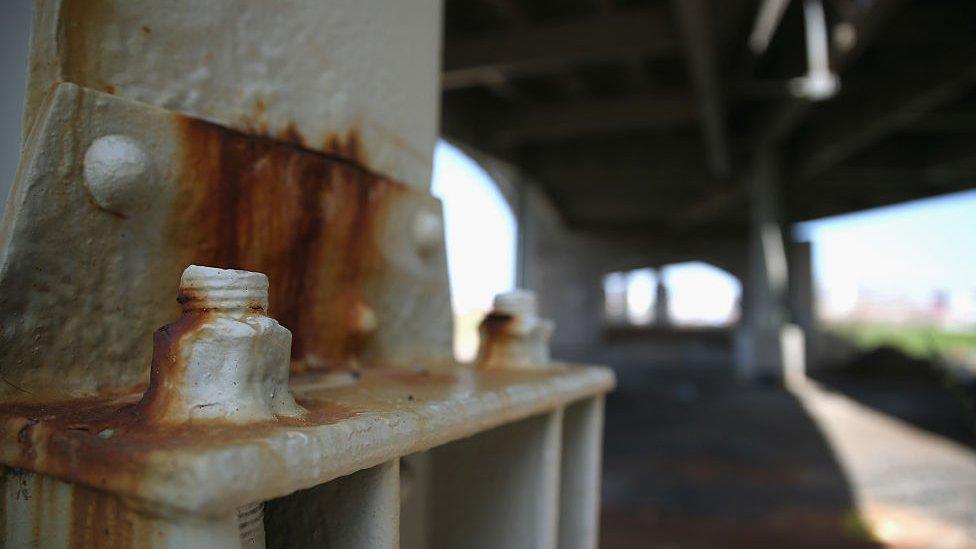
Infrastructure investment
In his election-night victory speech, the first - virtually only - campaign promise Mr Trump mentioned was his pledge to ramp up investment in US infrastructure projects.
"We are going to fix our inner cities and rebuild our highways, bridges, tunnels, airports, schools, hospitals," he said, external. "We're going to rebuild our infrastructure, which will become, by the way, second to none."
It shouldn't come as much of a surprise that the man who made his name in the construction business is focused on construction, to the tune of $1 trillion in new spending over 10 years, according to earlier proposals. Some Republicans will certainly balk at the associated costs - one congressman is already warning of the resulting "debt bomb" - but Mr Trump has found allies among the Democrats in Congress.
Democrats may be less enthusiastic if it turns out much of these new construction projects are publicly financed but privately selected and managed, as one Trump adviser has proposed, external.
Outlook: Infrastructure spending gives Trump an early opportunity to tout bipartisan co-operation while having a tangible end result he can take credit for. Republicans may drag their heels, but they'll be hard-pressed to deny him from putting an early campaign promise in the "kept" column.


Deportation
At various times during his campaign, Mr Trump promised to deport all 11 million undocumented workers living on US soil. "They will go out," he said.
He's since walked back such sweeping pronouncements, emphasising that removals will be focused on those with criminal records, such as drug-dealers, murderers and gang members. In a recent interview he said that number would total between 2 million and 3 million individuals - which is significantly more than the roughly 180,000 undocumented migrants with criminal convictions the US government currently says, external remain on American soil.
Trump's deportation figures: Are they true?
To get to that higher number, Mr Trump would likely have to vastly expand the definition of "criminal alien" or include all non-citizens with criminal records, regardless of their immigration status.
No matter how he slices it, removing such a large number of people would be a task well beyond the US Immigration and Customs Enforcement agency's ability, which with current staffing and funding levels can process, external about 400,000 undocumented immigrants a year.
Outlook: Mass deportations - numbering in the millions - seems to be one of the campaign promises Mr Trump is determined to stand by. In the face of reluctance from Congress and financial obstacles, however, it will be tough for him to make the numbers add up.


Tax reform
If there's one topic that has been near and dear to the hearts of traditional Republicans, it's cutting taxes. One of Mr Trump's more conventional conservative campaign promises was his proposal to reduce rates for individuals and corporations across the board.
He will find a Republican-dominated Congress more than willing to help him accomplish that. Democrats during the Obama administration succeeded in rolling back many of the tax cuts pushed by Republican President George W Bush, including the estate, personal and capital gains tax breaks. Look for them to be restored.
Five questions on economy for Trump
Democrats in the Senate will likely fight these proposals, calling them a gift to the wealthy, but they won't have the votes by themselves, as the chamber's rules only require a simple majority to enact budget changes.
An interesting question for the Trump administration will be how aggressively it pushes the childcare tax credit Mr Trump unveiled in September. Some measures, such as guaranteed six-week paid maternity leave and efforts to compel employers to provide childcare, run counter to conservative orthodoxy.
Outlook: If Republicans control the levers of power, chances are very good a tax cut is coming. What it looks like, and who benefits the most, is still an open question. If Mr Trump's efforts veer too much toward helping the wealthy, he risks alienating the working-class voters who delivered the presidency to him.

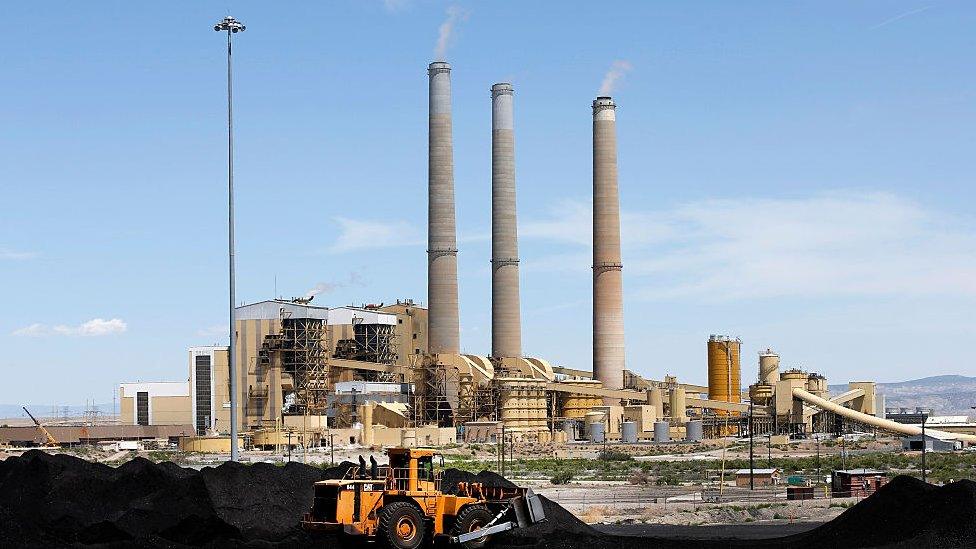
Deregulation
Mr Trump has promised sweeping deregulation of business and industry, which he claims is hindering US economic growth.
He wants to repeal Obama-era financial reforms, including a soon-to-be-enforced requirement that financial advisers have a fiduciary duty to act in their client's best interests. Some of this will require congressional action, while others he can implement through the discretion afforded executive agencies.
He also has proposed curtailing environmental rules such as limits on greenhouse gas emissions from US coal plants. He plans to ignore the agreed-upon targets imposed by international climate treaties and streamline the process for obtaining government approval for oil and gas drilling.
Senate Democrats will try to block legislative deregulation - and, as long as the filibuster rule requiring a 60-vote majority to act is kept in place, they will have some power. Meanwhile, environmental groups are sure to try to prevent executive action with a flurry of lawsuits.
Outlook: The Obama administration showed that even without control of Congress, the presidency afforded considerable power to shape public policy. Now, with Congress at his side, Mr Trump will have a free hand to roll back much of what his predecessor enacted.

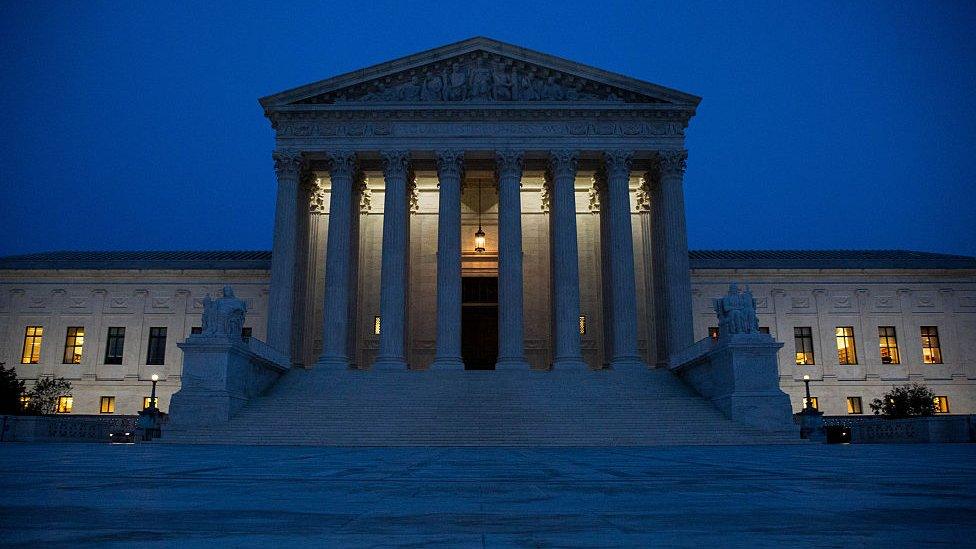
Supreme Court
One of the top prizes of the 2016 presidential race was the chance to make a new lifetime appointment to the Supreme Court, thanks to the Senate Republican leadership's decision to delay consideration of Mr Obama's nominee following the death of Antonin Scalia in January.
During the campaign, Mr Trump published a list of conservative judges, legal scholars and politicians from which he would choose the next justice - a move that helped shore up his support among the evangelical right, which recoiled at the prospect of a liberal majority on the high court.
Mr Trump will likely announce his selection shortly after he is inaugurated - if not beforehand - and the Senate is sure to move quickly to hold confirmation hearings and a vote.
Senate Democrats may decide to filibuster the nomination, which would force Republicans to marshal 60 votes to seat the new justice. There's the possibility that they could do away with the filibuster for Supreme Court nominations, however, as Senate Democrats did for lower-court appointments.
Outlook: Assuming Mr Trump doesn't pick a wildcard who lacks conservative bona fides, the Republican Senate should give his nominee smooth sailing to the court. Democrats will fight, but they may try to keep the filibuster intact in case Mr Trump gets the opportunity to replace a liberal judge later in his presidency.

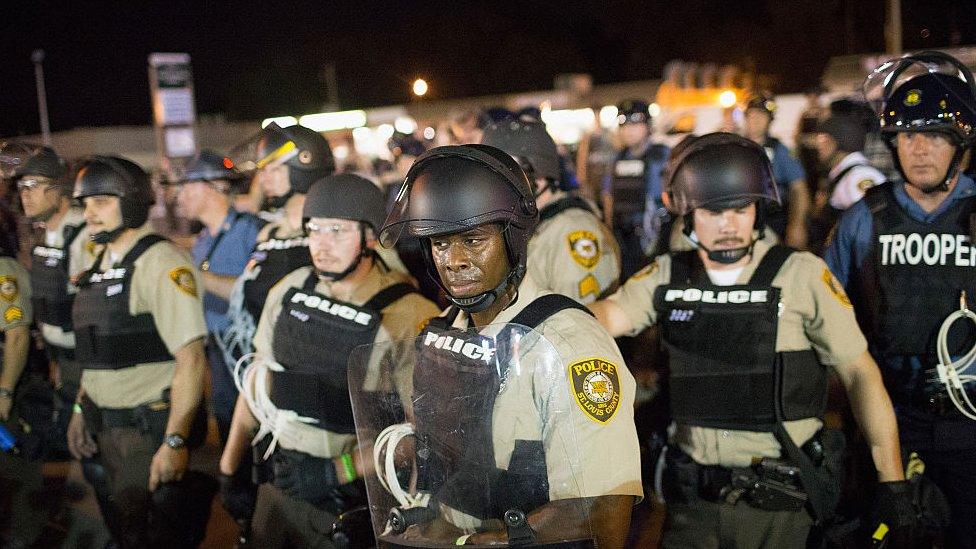
Law and order
There was a moment, not too long ago, when it looked like criminal justice reform would be an issue on which libertarian-minded Republicans and civil rights Democrats could forge a bipartisan consensus.
Mandatory minimum sentences were viewed as too restrictive, often resulting in disproportionate punishment for poor and minorities. Police tactics were deemed too harsh.
Then Mr Trump swept to the Republican nomination and, subsequently, the presidency while citing questionable statistics about runaway urban crime and calling for an increase in police powers and more stringent sentencing. He questioned the appropriateness of government-provided lawyers for indigent defendants and suggested prison life for convicts was too luxurious.
The new president will be able to unilaterally undo Mr Obama's efforts to grant clemency to some federal inmates, restore police access to government military-grade equipment and suspend Justice Department efforts to collect data on instances of police shootings.
Outlook: Mr Trump will have broad power to affect federal policies on crime-fighting, although as Vox's German Lopez points out, external, there is room for reform efforts to continue on the state and local level. Criminal justice legislation of any kind - even for measures Mr Trump supports - will likely be a very low priority in the next Congress.